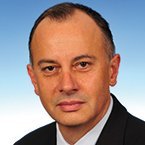
Fotolia
CIO interview: Martin Hofmann, Volkswagen Group
Volkswagen Group recently demonstrated how it was working with D-Wave to research uses for quantum computing. We find out what the car maker is hoping to achieve
During the recent CeBIT 2017 event in Hannover, Volkswagen Group discussed how quantum computing would be the future of IT.
The Volkswagen Group is planning to use quantum computers to bolster its digital competency programme, in a bid to create an innovative application that cannot be programmed traditionally.
The initiative, a collaboration between quantum specialist D-Wave and Volkswagen Labs in San Francisco and Munich, aims to build specialist expertise at Volkswagen and identify uses of quantum computing in the company.
“Quantum computing technology can bring tremendous progress to Volkswagen with respect to all the key IT and digitisation topics of the future. We expect a wide range of application possibilities, especially in the areas of autonomous driving, artificial intelligence-supported process control, the smart factory, machine learning and intelligent mobility,” says Martin Hofmann, CIO of Volkswagen Group.
Smart mobility is one of the areas where Hofmann believes quantum computing could be applied. “Just imagine the simulation of traffic in a major metropolis,” he says. “In order to optimise traffic flow, computers must calculate where the individual vehicles are driving at any time, and where congestion will form.
“On the basis of this forecast, they must calculate how each individual car must be routed to avoid a traffic jam before it even forms. This is a highly complex calculation involving billions of data items.”
While many of these tasks can be handled by traditional computers, Hofmann believes the computing potential of supercomputers offers significantly greater possibilities of making dramatic progress.
Read more about quantum computing
- D-Wave Systems has released an open source quantum computing chunk of software.
- A universal quantum computer, available through the cloud, offers the potential for researchers and enterprises to tackle computationally impossible problems.
Yet even the high-performance computing (HPC) offered by such supercomputers will be challenged by some highly complex computational problems. Quantum computers offer the potential to solve such problems many times faster than conventional supercomputers.
To date, quantum computing technology has been used primarily by scientific institutes, government agencies and in the aerospace sector, but Volkswagen Group hopes to develop commercially viable applications of the technology.
Testing D-Wave’s quantum computer
The first research project where quantum computing will be applied to traffic flow optimisation is in the Chinese city of Beijing. “Data scientists and big data experts from our IT labs in San Francisco and Munich are testing the programming of applications and algorithms on D-Wave’s quantum computer,” says Hofmann.
“Our experts have already successfully developed and tested a traffic flow optimisation algorithm. Our strategic cooperation with D-Wave is very valuable to us, as our current focus is on the further development of specialist expertise and entrepreneurially meaningful applications,” he says. “Further projects are to follow in the course of cooperation with D-Wave.”
In simplified terms, an optimisation problem considers how a specific resource – such as time, money or energy – can be used in the best possible way in a certain scenario. The complexity of the task, and therefore the computing capacity required exponential growth. Running optimisation algorithms when there are huge numbers of variables can quickly overpower conventional computers, pushing them beyond their limits.

“Our current focus is on the further development of specialist expertise and entrepreneurially meaningful applications”
Martin Hofmann, Volkswagen Group
Conventional high-performance computers can be applied to solve such computationally complex problems, but, according to Hofmann, they may take 30 to 45 minutes to produce results that a quantum computer can deliver in three seconds.
“HPCs are far too slow. Within 30 minutes, the traffic jam would have already formed,” he says.
Quantum computer solving traffic flow
The computing principle of a quantum computer is especially suited to this project because it natively solves optimisation problems such as traffic flow.
The IT experts at Volkswagen Group were able to demonstrate traffic optimisation running on the D-Wave quantum computer, which paves the way to smart city optimisation.
“They used the data of about 10,000 taxis in the mega-city of Beijing for this purpose,” says Hofmann. “We also learnt what data is needed, and how to structure algorithms to eventually manage and optimise any moving object in an urban environment. With autonomous vehicles under development we see this as important as the vehicle technology itself.
“The quantum computer we are utilising from D-Wave is not a general quantum computer,” he says. “It has a narrow field of application.” The D-Wave machine is particularly suited to optimisation algorithms.
Combining two concepts for faster optimisation
Artificial intelligence systems are often applied to recognise patterns and rules, and machine learning and deep learning based on multi-layer neural networks are better suited to pattern recognition and prediction.
“Combining the two computing concepts exploits both strengths. Pattern recognition and prediction on traditional high-performance machines transfers the results over to the quantum computer and provides faster optimisation, before transferring results back to the high-performance machines,” says Hofmann.
“The use of quantum computing can bring considerable progress in this area, and the computing power available is outstandingly suited to solving specific problems such as optimisation issues,” he says.
While it is still too early to talk about the possibilities of the commercial utilisation of quantum computing at Volkswagen Group, Hofmann says: “We are initially focusing on the acquisition of specialist knowledge. The objective is to make effective use of the strengths of a quantum computer.”









